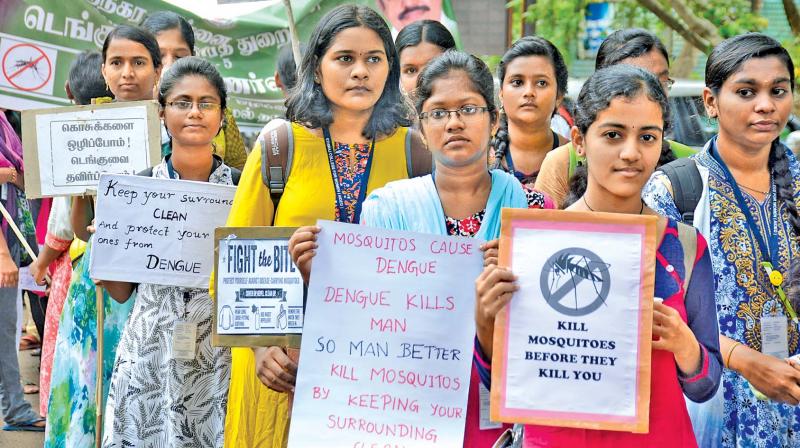Chennai: Doctors seek to identify dengue virus strain
Molecular study of dengue virus needed to decide on treatment options.

Chennai: With the Armed Forces Medical College, Pune, discovering the fifth serotype of Dengue virus (DENV5), the Doctors for Safe Environment (DoseE) here has called upon the government to take up a molecular study to identify which strain is causing the epidemic claiming scores of lives in TN besides afflicting several thousand.
Identifying the virus strain will throw light on deciding the course of treatment and also the precautions to be taken to safeguard one from this dreaded fever. “Also, we need to find out if Aedes Aegypti or Aedes Albopictus is causing the viral infection. This distinction is very crucial because the if its due to Aedes Albopictus, which lays eggs deep in the water, no amount of fogging will serve the purpose,” claims Dr V. Pugazhenthi of Dose. Speaking to this correspondent here on Thursday, he said the treatment options would change depending upon the kind of mosquito that bites.
“In 1976, during Indira Gandhi’s reign, ICMR signed an agreement with WHO and US government for a research on Aedes Aegypti. Later she was cautioned that this may be a kind of warfare, so she cancelled the project,” he said. The warfare potential of dengue virus should be considered in the light of the medical fact that the density of the dengue mosquito is within two km. “So, how come in TN same time lot of places are involved, causing a kind of epidemic, that is the question. In 1996, dengue affected Delhi and they did molecular testing of the virus. As per WHO protocol, you have to do the molecular testing to find out the nature of the virus so as to plan effective treatment or whether a vaccine will be useful in a particular scenario,” he emphasised.
So far such study has not been done by the Union health ministry, Dr Pugazhenthi claimed and said scientist Basha headed the team that had studied the virus and found that it was a new virus. That is serotype 4, which was not there in India before. “Generally, warfare should be suspected when the mortality rate is too high. Normally the dengue mortality rate is 0.25 to 1 per cent. That is if 100 persons are affected one will die. But in 1996 dengue, it was close to 4.5 per cent, more than 10,000 were affected and of them close to 426 lost their lives. So, the high mortality rate prompted the Centre to take up molecular testing and they confirmed that it was a new strain,” he added.
He recalled that then home secretary Kamal Pandey in October 2001 declared that in India there are three diseases which could possibly come under bio-warfare: plague outbreak in Surat in 1994, because that bacteria was not identified in India before that period, dengue in Delhi in 1996 and brain fever case in 2001 in Siliguri in West Bengal – all resulted in high mortality. This needs to be remembered because in the case of an outbreak in Delhi they could not identify from where the virus could have originated.
It is said there are only four strains, but the fifth was identified by AFMC, Pune, and they clearly highlighted that because of the new virus, a vaccine would not work in the Indian scenario. “In India, we need to find out which strain is causing the outbreak,” he said and asserted that even Sowmya Swaminathan, director general of Indian Council of Medical Research (ICMR), said that India needed to identify the general baseline data and that the government has formed an expert committee to study the prevalence of dengue in India. Now ICMR has taken up the project to identify the viral strain in each state.
Fifth serotype of dengue virus discovered
Till now, dengue fever was believed to be caused by four different serotypes but the Armed Forces Medical College, Pune, discovered the fifth variant DENV-5 in October 2013.
This serotype follows the sylvatic cycle unlike the other four serotypes which follow the human cycle.
The likely cause of emergence of the new serotype could be genetic recombination, natural selection and genetic bottlenecks.
There is no indication of the presence of DENV-5 in India. Recent clinical trials with the promising Chimerivax tetravalent vaccine suffered a setback.
Discovery of DENV-5 and more such sylvatic strains in future may further impede the Dengue Vaccine Initiative. Integrated Vector Management holds the key to
sustainable dengue control.
Further epidemiological and ecological studies are needed to detect additional sylvatic dengue strains, says an article in the Medical Journal Armed Forces India.

